- Home
- Phillip Tomasso
Evacuation - 02 Page 18
Evacuation - 02 Read online
Page 18
He sat on the ground and waited as Hutapec climbed the slope, disappearing into the trees for fifteen minutes before reappearing beside the motionless men. He waved Roger and Saldo forward. Roger’s heart pounded both from the exertion of the climb and from a sense of dread that mounted with each step that he took. It soon became apparent that Harris and the others were indeed dead. The stench of decay surrounded them, along with another odor, reminiscent of overripe bananas.
As he climbed over the last boulder and got his first close glimpse of Harris, the manner of the men’s deaths became apparent, but still unbelievable. What he had first mistaken as vines anchoring them to the ground, was a network of finger-thick mycelia from a strange fungus growth covering the men’s bodies, almost completely enveloping them. Their desiccated flesh sprouted tendrils with dark purple bulbous tips that swayed ominously in the breeze. Similar bulbs emerged from their ears, eyes, nose, and cracks in their skull, as if their brain had exploded from within. As he watched in horror, one dark bulb burst open, spewing tiny spores that drifted with the wind toward him. The smell of rotten bananas increased. Hutapec, who had remained cautiously upwind of the men, scampered higher up the slope away from the scene of death.
“What … what is this?” he asked Saldo.
Saldo shrugged. “A fungus, maybe, but I’ve never seen it before.” He spoke to Hutapec, who barked out a one-word reply. “He calls it Black Death,” Saldo said. He shrugged again. “I don’t know what he means. He is afraid to speak more of it.”
Roger was puzzled. “Why did they just stand here and let the fungus grow on them?”
“Quien sabe. Who knows?” Hutapec pointed to a nearby ravine and spoke. “Hutapec says six others, all native guides, are also dead, mauled, as if by a jaguar, but he thinks these men did it. Look at their hands.”
Roger saw that three of the dead men’s hands were crusted with dried blood. He refused to believe civilized men could do such a thing. “They wouldn’t kill anyone. They’re scientists for Christ’s sake.” He glanced down at the Chiquibul River flowing westward into Guatemala after emerging from the caverns. The late afternoon sun glinted off its surface like a ribbon of glass stretching through the jungle. “Where are the caves from here?”
Saldo pointed below and to the east. “There, but Hutapec will not go, nor will I. The natives think the caverns are the entrance to hell.”
“You don’t believe that?”
“Hutapec does, and he will not go,” Saldo replied, as if it were explanation enough. He glanced at the bodies and made the sign of the cross. “After seeing this, I will not go either.”
“We have to bury them and call the authorities.”
“We must go back. It will be night soon. Hutapec believes the moon, Uh, will be an evil one. Bad things are happening in the land.”
At this, Roger turned on him. “Why did we avoid San Antonio?”
Saldo paused as if reluctant to speak. Finally, he said, “There were mobs of men, violent men who killed like animals.” He glanced with revulsion at the ravine where the dead natives lay. “Like them.”
Roger was appalled. “You can’t be serious. Men killing like animals.”
“It is so,” Saldo insisted. He pointed to the river below them. “The river flows through San Amelia in Guatemala. There are rumors of much violence there as well.” He crossed himself. “It is a time of much evil.”
Looking at the erect corpses of his colleagues, sent a shudder running through Roger’s body. “We have to bury them,” he insisted.
Saldo nodded. “I will help you, but Hutapec will not touch the dead.”
Two hours later, Roger and Saldo had managed to scrape five shallow graves in the hard earth of the slope and cover the bodies with rocks. Neither Saldo nor Hutapec offered to bury the natives, so Roger ignored them. The jungle would quickly reclaim their bodies. Roger started at the five cairns of stone and the small pile of personal effects he had removed from the bodies. One item was Harris’ journal, slightly moldy and smelling of death. He was loathe to touch it, but hoped some clue to the men’s bizarre deaths lay within its crumbling pages.
After they had interred the bodies and he had intoned a few words of parting over his friends, Roger was eager to read the diary, but Hutapec refused to linger in the area. The guide set a quick pace back down the mountain toward Punta Corda where a boat waited on the coast to transport Roger back to Belize City. From there, he would alert the authorities about the deaths. The authorities, he assumed, would exhume the bodies so they could have a proper burial in the States.
The jungle, normally thriving with wildlife and filled with the sounds of predators hunting prey and with raucous territorial calls, was eerily silent. Hutapec remained silent as well, refusing to speak even to Saldo. As they hacked their way through the jungle, Saldo kept his eyes on the surrounding trees. He, too, was strangely reticent, speaking only when Roger initiated conversation, and even then, he answered succinctly, ignoring any of Roger’s attempts to draw him into any discussion pertaining to what they had seen. His nervousness fed Roger’s growing apprehension.
At dusk, they made camp in a small clearing beside a quiet stream. Neither Hutapec nor Saldo laid out their bedrolls for the night, choosing instead to remain awake and watchful through the night. Saldo kept the campfire banked low, as if afraid of attracting unwanted visitors. He kept his rifle across his knees. After a hurried meal, Roger opened Harris’ diary and began reading by flashlight. He skipped the first part concerning the journey and began at the point where Harris had reached the cavern.
* * *
June 6 – Chiquibul
“The caverns are spectacular, true wonders of the world! I have delved the depths of many systems in my lifetime but none as beautiful as these. They remind me of Cumberland Caverns in Tennessee. I hope we will find unplumbed depths.”
June 8 –
“Mapped out a great deal of the cavern. We discovered a new grotto deep within the caverns hidden behind an ancient rock fall. It proved a dead end, but inside, Louis Masters found a strange fungus growth which he claims should not survive in total darkness. Since his field is biology, I don’t doubt his word. He has taken samples for further analysis.”
June10 –
“I am feeling feverish and exhausted, but perhaps it is due to the rapid pace I have set for our expedition. There is much to be done and little time in which to accomplish all our goals. Masters is complaining of chills, and Doug Seals is coughing incessantly. Perhaps my fatigue is related. I issued aspirin and Chloroquine for all of us, just to be safe. I hope we will not have to cut our survey short.”
June 11 –
“Seals has gone insane. I can think of no other word for his state. We awoke to find him missing from camp. We later spotted him rushing through the caverns in complete darkness, screaming like a wild man. He attacked us when we attempted to subdue him. We finally managed to sedate him. The chase weakened me severely. I must rest.
“Masters says he has identified the mushrooms as an unknown species of the genus Orpicordyceps unilateralis, known as the ‘zombie fungus’ because of its bizarre effect on some ants. It produces cyclosporine, an immunosuppressant. Perhaps that is why we feel ill. The jungle is awash with insect-borne diseases. In our weakened condition, our bodies cannot fight them off. I am gravely concerned.”
June 12 –
“My mind reels with insane thoughts. It burns as if on fire. Seals has escaped and I cannot rouse Ellis to help me search for him. I believe this fungus we have discovered is to blame. I found tiny strands of mycelia in my sputum. We are all infected. The native workers are frightened and threaten to abandon us.
“I have been wondering if the presence of this strange fungus is the cause of the sudden disappearance of the ancient Maya from the nearby ruins of Lubaantun and Cahal Pech. Their abandonment was rapid and mysterious. Perhaps, I’m wrong, but the coincidence is frightening. We must leave this place.”
June
13 –
“Now Masters is missing. I feel I am going insane. I can feel this fungus coursing through my body, devouring it bit by bit. It’s in my head. My thoughts are wandering, boiling into bouts of barely controlled rage. It is difficult to concentrate on this journal. I am very ill and I anger easily. I lashed out at McNeil for no reason. We almost came to blows. The damned natives are in the jungle singing some screeching gibberish that is grating on my nerves. I must stop them.”
The journal ended at that point. The last few entries were almost illegible, hastily scribbled in a trembling hand. Roger closed the book with a sickening feeling. An intense sense of dread swept over him. If the fungus had escaped the cavern system, it could even now be flowing in the waters of the Chiquibul River into Guatemala, or riding on the winds into Belize. He wondered if he was infected. He tried hard to convince himself that his aches and pains were due to the hardship of the journey and not the first signs of infection. Sleep did not easily come to him. Instead, dire visions of the end of the world and quivering mushroom men stalking the streets of Nashville played like a horror movie through his head. He awoke exhausted an hour before dawn. Hutapec and Saldo were already breaking camp. Their haste fed his trepidation.
“Leave the equipment,” he snapped at them, “I want to reach Punta Corda as soon as possible.”
Neither man argued. Hutapec dropped the supplies and plunged into the jungle with his machete breaking a trail. Saldo left his pack but cradled his rifle in his arms as he followed Hutapec. With a final glance back toward the Chiquibul Caverns, Roger followed them.
* * *
June 29, Miami, FL –
Roger knew he was infected. Each spasm of coughing racked his chest. His skin itched and burned. He was surprised the TSA people had allowed him through the airport in his obviously ailing condition. The bright lights blinded him through his shades, and the hordes of noisy people punished his eardrums. He couldn’t spend another hour in the confines of a jet or in a crowd. He was weak and feverish. He needed to rest before continuing his journey to Nashville where he would see his doctor.
The desk clerk at the Miami Hilton Airport smiled congenially at him as he staggered through the door, but he knew that her smile was a lie. He could hear her heart beating out blood to each forced muscle around her mouth. She resented his intrusion into her busy day. He stumbled into the red velvet rope separating the desk from the lobby and cursed loudly.
“May I help you?” the receptionist asked.
“I need a room,” he replied gruffly.
“We have …”
He cut her off and thrust his credit card at her like a weapon. His hand shook uncontrollably. “Here! Just give me a damn room.”
She dropped her smile but complied with his request. It seemed an interminable amount of time passed as she entered his information in the computer. He ignored the curious stares of the other people in the lobby, suppressing his desire to lash out at them. Finally, she handed him a keycard in a small paper cardholder.
“Room 517, Mr. Curry. I hope you enjoy …”
He snatched the key from her hand before she could finish her statement, stumbled with his bag to the elevator, and stepped inside. The bright overhead light of the elevator drilled into his brain like a laser. His eyes barely focused long enough to see the numbers as he punched the twelfth floor button. Leaning against the rear wall, swiping at the beads of sweat dotting his forehead, he pressed his hand to his aching stomach. It had been hours since he had eaten, but he feared its rumblings were not from hunger. He watched an obese woman, matronly and stern in a high-collared, pale blue dress, approach the elevator. She entered the car, moving to the opposite wall as far away as possible in the small space, and stared at him. He tried to ignore her, but her mere presence annoyed him. He suddenly doubled over in pain, as the convulsions in his belly sought an outlet. He farted loudly. The woman wrinkled her nose at the cloying stench and shot a reproachful glare at him as the doors began to close. She stopped the door with her hand and stepped out saying, “How rude.” He resisted the urge to wring her fat neck.
In his room, he dropped his bag on the floor and yanked the curtains shut to hide the offending setting sun. The room was stifling. He spun the thermostat from 72 degrees to its lowest setting. His tongue was too thick for his mouth and his throat ached. He gazed at his reflection in the bathroom mirror as he poured water from the tap into a glass. It was like looking through a veil. He removed his sunglasses. A fuzzy growth protruding from the corner of his left eye had sent tendrils across the pupil. He tried to extract it with his finger but only succeeded in mashing the tendrils and making a mess. He ignored the pain. His skin was sallow and clammy.
Disturbed by his stark image, he backed away, crashed into the door, and, in a fit of rage, threw the glass he was holding at the mirror. Tiny shattered images of him cascaded into the sink from the broken mirror. The sound of breaking glass thundered in his ears, echoing as if in a cavern. He clamped his hands over his ears, but the sound didn’t diminish. He raced around the room clawing frantically at the floral-print wallpaper, tearing it off in thin strips with his fingernails. He jerked a picture of an ocean scene from the wall above the bed and smashed it to the floor, grinding his heel into the broken glass. Exhausted, but not satiated by his orgy of destruction, he collapsed on the bed, panting. His brain was on fire, threatening to spill out through his ears. He pressed his hands to each side of his head and screamed.
He didn’t know if he slept or if his mind had simply stopped functioning for a while. When he opened his eyes, it was full dark outside. The room, though spacious, closed in on him, smothering him. He needed air, open space, some place high above the din and the light. He threw open the door to his room and raced down the corridor, banging on doors and yanking pictures from the walls. At the elevator, he overturned a marble table, smashing a large flower-filled oriental vase on the tiled floor. A rage rose in his gullet like bile. He bit back on it but could not stop the scream that ripped from his throat, a wail of anguish and anger that echoed down the corridors.
The elevator door opened. Two men dressed in business suits stepped out. Engaged in conversation, they paid him no heed, brushing by him as if he did not exist. One glanced at the overturned table and the pool of water from the shattered vase, but quickly turned his attention back to his companion. Roger growled at him. A blind fury born of dark images moved him to action. He leapt upon the man and beat him savagely with his fists. When the man’s companion tried to help, Roger bit his arm, grinding his teeth in the man’s flesh until blood sprayed them both. The man screamed and fell. Roger kicked him in the head until he no longer moved. He then chased after the first man who had used Roger’s attack on his friend to try to escape.
He caught the man outside the room containing the ice machine. The man’s high-pitched screams drilled into Roger’s befuddled mind like burning augers, searing flesh and burning away who he was, what he had been. He was no longer human, but an animal. He clamped his hands to his head and moaned, but something inside drove him back to the creature in front of him. The man pleaded, but the words held no meaning to Roger, just more noise pounding in his head. His hands throttled the man’s neck and twisted. He continued to twist long after the man’s face had turned blue and his jaw had fallen open. His lust for blood still not satisfied, he pounded the man’s head against the ice machine until blood, pieces of bone, and bits of brain dripped down his arms. Ice, summoned by the pounding, filled the recess for ice buckets and spilled onto the floor around his feet, joining the blood staining the tile.
Curious heads drawn by the screams thrust through opened doors. He ran from their stares. His body burned from within. He felt as if he were going to spontaneously combust; become a human torch. He shed his clothes as he stumbled down the corridor. He opened the door to the stairwell and ran upwards, yearning for some place high above the clamoring din. He kicked open the roof door and walked to the edge of the roof. Standing t
here, staring down fourteen floors to the swimming pool, he wanted to jump, to end the pain, but found he couldn’t; not from fear of dying, but because his mind, no longer his own, wouldn’t allow it. A tear trickled down his cheek, followed by a tiny tendril of mycelium fiber licking at the moisture. Frozen to the spot, unable to force his muscles to move, he wept. Tears ran unfelt down his cheeks, their moisture feeding the tiny growths pushing through his pores. He knew he was dying. He would soon become food, a host for the monster growing inside him. Remembering the horribly grotesque bodies of his colleagues in Belize, he wanted to shudder, but his mind denied him even that small release.
Cordyceps Rising is available from Amazon here
About the Author
Phillip Tomasso is the award winning author of numerous novels, and short stories. He works full time as a Fire/EMS Dispatcher at 911. He lives in Rochester, NY with his three children, dog, Fettuccine and cat, Luca. He is always at work on his next tale.
www.philliptomasso.com / [email protected]
@P_Tomasso
Other Titles by Tomasso
Vaccination
Sounds of Silence
Pulse of Evil
Pigeon Drop
Convicted
The Molech Prophecy (as Thomas Phillips)
Adverse Impact
Johnny Blade
Third Ring
Tenth House
Mind Play

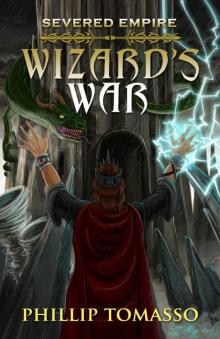 Severed Empire: Wizard's War
Severed Empire: Wizard's War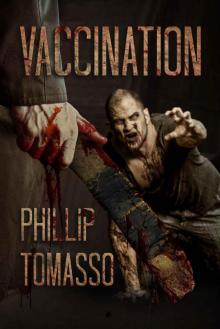 Vaccination - 01
Vaccination - 01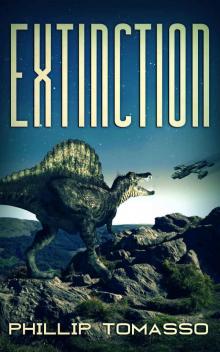 Extinction
Extinction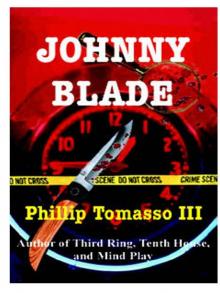 Johnny Blade
Johnny Blade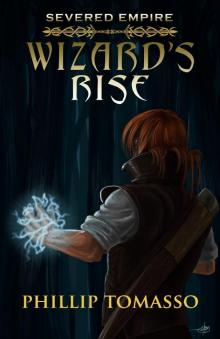 Severed Empire: Wizard's Rise
Severed Empire: Wizard's Rise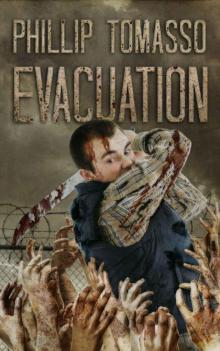 Evacuation - 02
Evacuation - 02 Absolute Zero
Absolute Zero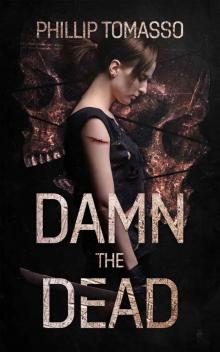 Arcadia (Book 1): Damn The Dead
Arcadia (Book 1): Damn The Dead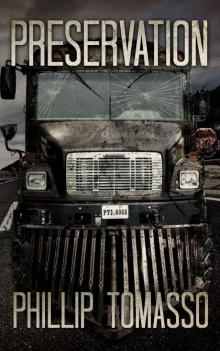 Preservation - 03
Preservation - 03